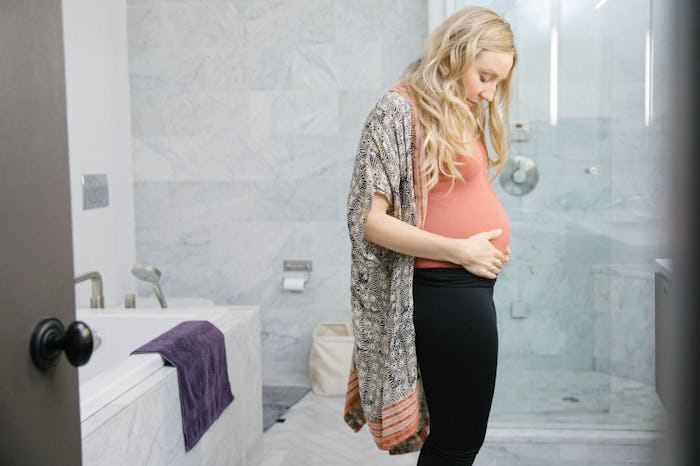Life
Here's How To Tell If Your Baby's Hiccuping In The Womb Or Just Kicking Around
While still hanging out in your belly, a baby can do a surprising number of fascinating, quintessentially human things. She can yawn, blink, practice her facial expressions, and even (most adorably) hiccup. What do baby hiccups feel like, you ask? While you probably have to experience them for yourself to truly understand, a few moms attempted to explain the sensation to Romper, through metaphor.
"It felt like popcorn popping, honestly," Sarah, 31, and a mother of one, tells Romper, perfectly capturing the sudden yet rhythmic feeling of baby hiccups. And another: "It felt like she was plucking an elastic band that was attached a spot just below my ribcage," says Ceilidhe Wynn, 31, noting that remembering the feeling today gives her the creeps, though it didn't freak her out at the time. Every time I felt baby hiccups, they reminded me of the metronome my piano teacher used during my lessons as a kid, with its regular, faint, tick-tock.
I was lucky enough to see my baby hiccuping during a routine ultrasound. (She had the hiccups a lot, and honestly, as a 16-month-old, she still does.) My doctor pointed at her slightly pulsing belly on the fuzzy, black-and-white screen, and told me that I should feel great, because she'd never seen a baby hiccup while in distress. For the rest of my pregnancy, a baby hiccup never failed to make me smile. Hurray, she was alive! And she sounded like she'd just downed one of her father's Dr. Peppers.
Though my doctor wasn't concerned about it, hiccups can sometimes be a sign of a dangerous medical issue. In rare cases, according to Healthline, hiccups may be a sign of a problem with baby's umbilical cord. But don't let that scare you. Every baby, and indeed, every person, occasionally gets the hiccups. It's all part of being human, and it starts in the womb.
So what are hiccups exactly, and what causes them? In adults, hiccups are essentially involuntary diaphragm contractions, explained Mayo Clinic. When your diaphragm suddenly contracts, you're forced to close your vocal cords, which makes the "hic" sound everyone recognizes. EMedicineHealth noted that hiccups might be caused by swallowing air while chewing gum, eating too fast, or smoking. As most people know from experience, eating too much in one sitting can also result in a prolonged and uncomfortable case of the hiccups.
Why do babies hiccup? They're practicing their breathing, reported The Bump, even while they're not really breathing air. When your baby inhales, she draws amniotic fluid into her lungs, which stimulates a contraction in her diaphragm. Hiccup. But how exactly do you know what you're feeling are baby hiccups, and not kicks or other fetal movements? Writing at UT Southwestern Medical Center, Robyn Horsager-Boehrer, M.D. explained that if the small movement feels rhythmic and lasts for a few minutes, it's likely hiccups. It still amazes me that you can see a baby hiccuping on a sonogram, and it makes me wonder if hiccups feel as intense to fetuses as they feel to us.
Because every pregnancy is different, not everyone will feel their baby hiccuping in utero. "Two pregnancies and I never felt it! I feel cheated," says Jamie, 35. Though you might not experience fetal hiccups for yourself, it's very likely that all babies do hiccup in the womb, with some hiccuping more than others, according to a study in the Journal Of Comparative Psychology. The study also showed that moms are most likely to feel these tiny pops during their third trimester, and especially in the final month. It's no wonder — in advance of her open-air debut, there's baby, practicing her breathing skills with a hic.
Check out Romper's new video series, Bearing The Motherload, where disagreeing parents from different sides of an issue sit down with a mediator and talk about how to support (and not judge) each other’s parenting perspectives. New episodes air Mondays on Facebook.
